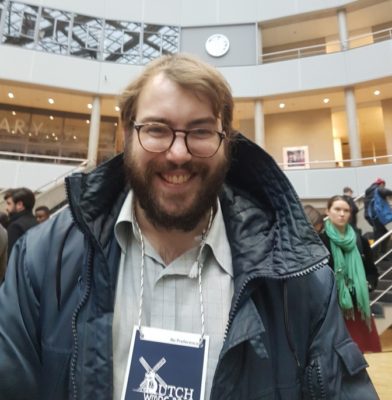WUDC Tips and Tricks from Veterans – Part 1
There is no other time in the year where more outstanding, successful, brilliant, superb, mind-blowing, astonishing, fascinating debaters meet at one location than whilst at WUDC. This makes Worlds the perfect time to talk to some of those people and get them to share their secrets to success.
Today on the day of the first rounds, the Achte Minute has spoken to three different people from Sweden and New Zealand. In this article you’ll find the tricks of the trade.
Gustaf Lundgren and Johan Båge – Stockholm
Sebastian Templeton – Wellington
Gustaf Lundgren and Johan Båge – Stockholm
Gustaf and Johan are both from the University of Stockholm and have been around in the debating scene for more years then they could possibly count (their guess is at around six). Their debating CVs include the Open Break at Worlds in Thessaloniki in 2016 and making it into the ESL Final of both Worlds and Euros, as well as having won “some” tournaments “here or there”, which may or may not be considered as “countless”.
On preparation for WUDC:

Gustaf Lundgren – Stockholm – © Helena Hecke
AM: How many tournaments did you go to, in order to prepare for Worlds beforehand?
JB: Well. We went to Euros. That was a good prep.
GL: Did we?
JB: We went to Oxford and that was it.
AM: Did you have some sort of routine to get better?
JB: We went to Euros. Also we watched a debate video like 5 years ago.
GL: Didn’t help.
AM: How did you prepare in terms of background knowledge?
GL: For me it came quite naturally ’cause I was always interested in philosophy and political news and so on. I don’t thing I’ve done much differently since I started debating. The only thing is, that I think about it a little bit more in terms of how you could use it in different settings.
AM: How did your society pick the two of you as a team?
JB: Our society consisted out of Gustav and me. We’ve had a discussion and decided we’re the team to go.
On things to do at Worlds:

Johan Båge – Stockholm – © Helena Hecke
AM: How do you use preparation time effectively?
GL: You start of by establishing the key problem and think about what the is the fundamental thing of the debate. What are you going to solve? What is the root of the debate? That’s a good starting point.
JB: Well. Then me saying things to Gustav and him writing down his stuff and pretending to be listening.
GL: We generally only prep one speech. We always focus on the first speech that is happening and whoever goes second has to just come up with something during the debate.
AM: What do you do when you’re nervous before a debate?
GL: If you feel like the motion is difficult and you think you know nothing about it, the others will probably also know nothing about it. Remember that most people are actually not smarter then you are. There is no point in being nervous. I know you’ll think “I’m the only person in the room who doesn’t know much about Rwanda!” or something, but that’s not true.
JB: Saying lies with confidence makes you win debates all the time.
AM: How do you cope with tricky PoIs?
JB: I give them!
AM: How do you use feedback given to you after the debate?
GL: Take it for what it is. Even if when you think the feedback is wrong in a way. Whenever you get a call, there is someone who made that call and take it as meaning full. Someone will see it that way and I always take it into account for the future.
AM: Thank you so much!
Sebastian Templeton – Wellington

Sebastian Templeton – Wellington – © Helena Hecke
Sebastian is a legendary debating Kiwi. He debates for the Victoria University Wellington for about ten years now. In the decade of debating he broke more often then he can remember, most importantly twice at Worlds and three time at Australs. Although Kiwis are normally flightless birds, this Kiwi managed to get to Berlin in 2013 and become 10th best speaker. In 2011 he also won Australs in South Korea.
On preparation for WUDC:
AM: What did you do before Worlds to prep?
ST: Probably about seven preparation tournaments in the few months before worlds.
AM: Did you have some sort of routine to get better?
ST: Not really. Just to debate as much as possible and try to debate against different people, cause at worlds you meet people from all around the world and just debating against teams from home is not really good preparation.
AM: How did you prepare in terms of background knowledge?
ST: I kind of read stuff that interested me. I mainly read The Economist, because judges read them and set topics based on them. Just all these sorts of magazines, and listen to podcasts and BBC world news and stuff like that.
AM: How did you get better as a team with your partner?
ST: Me and my partner at worlds, we debated together for about four years at several tournaments. So we just got used to each other. Once you get selected for a team you just put up with it and deal with it.
On things to do at Worlds:
AM: How do you use the preparation time?
ST: Because my partner and me debate together a lot, we knew what the simple arguments we could make would be and he made me write them down and then we thought about interesting stuff to make the debate different and not just fall into the same old traps?
AM: What to do when you get really nervous?
ST: What I like to do is just to put on music loudly and sit alone in a corner, if I can.
AM: How do you cope with difficult PoIs?
ST: If it’s tricky, stall for time. Like, not asking them to repeat it, but just repeat it to them, so you get some seconds. If it’s really tricky, you just loose.
AM: How do you cope with feedback after the debate?
ST: I try not to ask questions about the debate. That topic won’t come again. So I kind of try to look into things I can do better next time.
AM: Lastly, how does it feel to break at Worlds?
ST: It feels amazing. It’s the best thing you can do in debating. It feels really great.
hh./lok.





